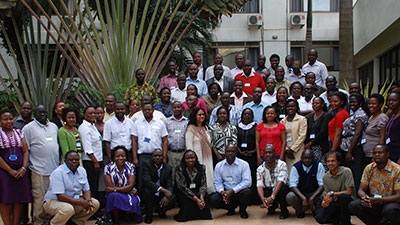KAMPALA, April 30, 2012 – A recent certificate training course introduced more than 60 participants to key concepts of land acquisition, resettlement and rehabilitation, and how they link to real life experiences.
The five-day Management of Land Acquisition, Resettlement and Rehabilitation (MLARR) course also provided hands-on training related to resettlement planning and implementation, and equipped participants with both basic knowledge and skills to manage complex land acquisition and resettlement programs.
“Uganda, like most Sub-Sahara Africa countries, has great deficiencies in knowledge and skills about involuntary resettlement in an environment devoid of a relevant policy, rules and standards,” said Mary Bitekerezo, World Bank task team leader for the training. “Very often, project-affected people are poor and vulnerable and, therefore unable to either stand up to bureaucratic and political pressure or on their own to absorb the adverse impacts on their lives.”
The MLARR course was jointly organized by the World Bank in partnership BRAC University, and three Ugandan universities: Uganda Martyrs University, Uganda Christian University and Makerere University. The course was organized in the context of a South-South Exchange Facility, promoting Centers of Excellence for Social Development in the Africa region. The course also included a one day training of trainers.
Out of the 62 participants, 23 of them were women, well above the 30% minimum participation of females in the Ugandan government’s affirmative action policy.
Amina Kyabangi Kagga was one of the women who attended the course. As a sociologist working with a consulting firm, Kagga wanted to participate in the training because found challenges in her work with social impact assessments (SIA) in infrastructure projects and wanted to improve.
“I think this course is very important because it highlights the roles and responsibilities of project implementers and social impacts,” said Kagga, a mother of four who nursed her youngest child between training sessions. “If things are not done well or correctly then people suffer. And this is the difference, we can make as implementers.”
Christine Mbabazi Mpyangu, a gender specialist and an assistant lecturer at Makerere University’s School of Development Studies and a gender specialist commutedfrom her home each day to attend the course.
“For the first time in my profession, I have experienced a perfect interface of theory and practice,” Mpyangu said. “The course helped me to appreciate how practice informs policy and in turn policy informs theory in the classroom.”
The training audience was carefully selected from 21 institutions around East and Southern Africa sub regions involved in projects with Involuntary Resettlement implications. These included projects staff, consultants, academia, NGOs and government of Uganda. Kenya, Malawi, Mozambique, Rwanda and Uganda were all represented at the course. The training materials were customized to the African context and included a short video on Managing Land Acquisition for Bujagali Hydropower Project in Uganda.
Due to high demand for the course, the next training is planned for the week of September 16, 2012, and the class is already full.

